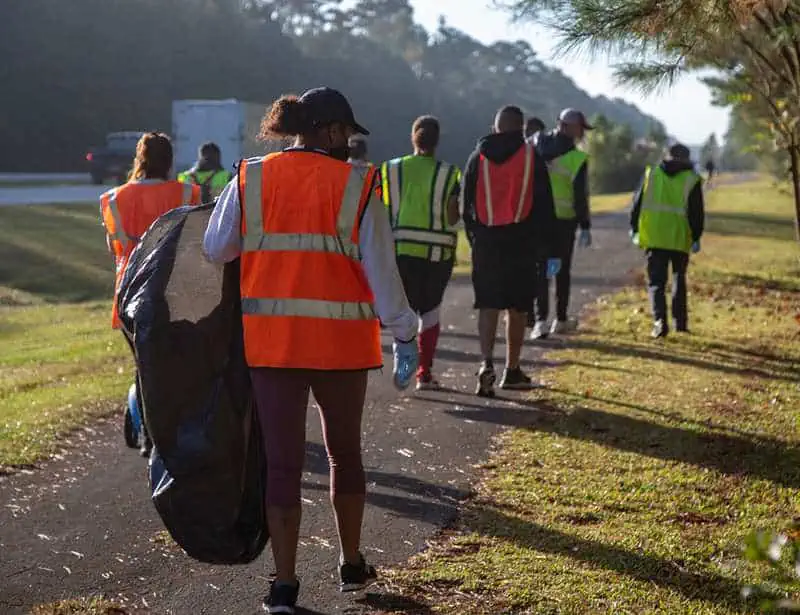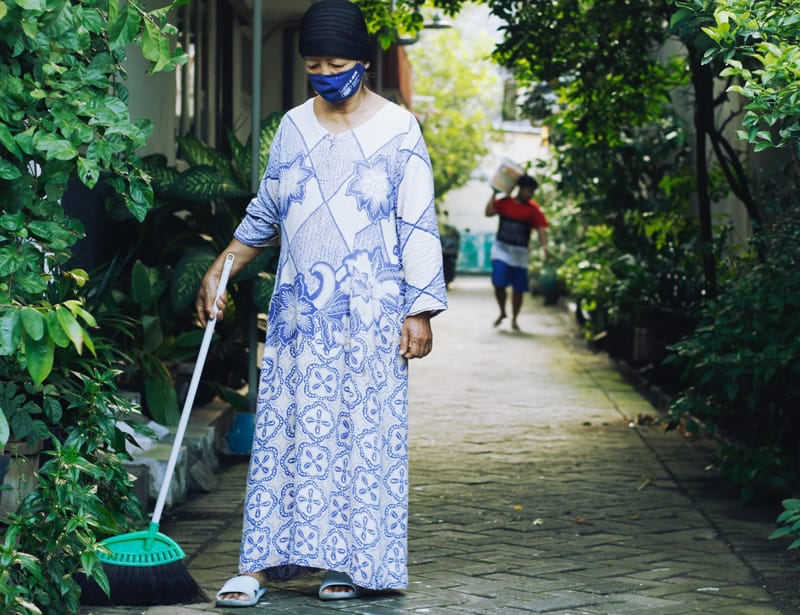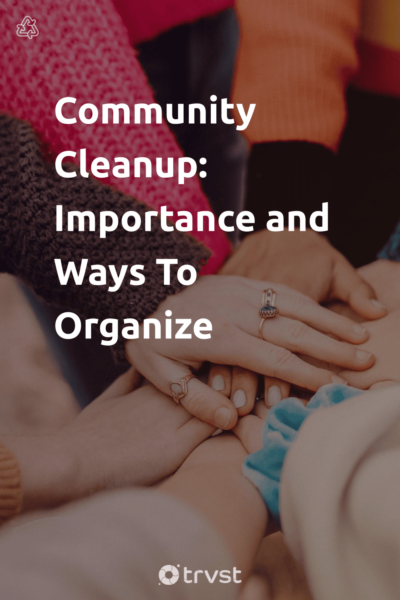Community Cleanup: Importance and Ways To Organize
Is there a place in your neighborhood you can't bear to look at as you pass by? You may live in a local environment with garbage on the streets or within a neighborhood used to illegal dumping. Organizing a community cleanup is the answer!
Hitting two birds with one stone, a cleanup program can uplift your surroundings and instill a sense of responsibility among residents. Read on to learn about other positive impacts and how you can organize a successful community cleanup.
Related Read: World Clean Up Day, Run a Local Beach Cleanup Event.
What is a community cleanup?

A community cleanup involves bringing volunteers within a neighborhood to clean up, repair, or revamp public spaces and specific areas that may have been misused, abandoned, or vandalized.
A cleanup project could involve picking up litter along the streets, renovating a playground or a park, beach cleanups, or cleaning up a vacant lot, to name a few.
Related Read: What Happens To Our Plastic Waste When We Discard It?
Why is a community clean-up important?
Organizing a community cleanup comes with multiple benefits. It is not only a way to clean and improve your local community but is also a great way to connect with neighbors and make new friends. Here are more reasons why a community cleanup event is important:
Improves security
Cleanups can improve the appearance of a neighborhood, making it less attractive to criminals. As residents come together to reclaim abandoned public spaces like parks and playgrounds and remove trash from the street, the neighborhood becomes more appealing to the community and less attractive to criminals.
Builds community spirit
A community cleanup helps to bring a real sense of responsibility and build a community spirit within a city. As more people come together to dispose of garbage and revamp their local environment, they can interact with one another and make new friends as they identify with a common goal.
Cleanup efforts also help to lay the foundation for waste reduction and inspire people to make little changes that benefit not only our neighborhoods but also our planet.
Safer environment for children
A neighborhood cleanup can create a safer environment for children. Scattered garbage and debris can be tripping hazards for little children. Participating in neighborhood cleanups can deter crime and vandalism and keep the community’s children safe.
Moreover, by improving the playground, parks, and public spaces, children can come out of their houses excited to play around the newly improved areas.
Reduces pollution
Trash and debris littered across the city contribute to pollution, affecting wildlife, human health, and our ecosystem. By conducting a community cleanup program, people can pick up trash and other waste products around the neighborhood, reduce pollution, and contribute to saving our planet.
Brings up property value
Clean communities increase the value of properties within the area. People will be willing to pay more for well-maintained homes. Also, cleaning buildings and facilities within the neighborhood helps improve the equipment's lifespan and protect property investments.
Improves local economy
Cleaning local communities can create a positive impression and encourage people to spend more time and money in these areas.
For example, clean buildings, parks, and playgrounds will encourage people to use these facilities more often. This can attract businesses, investment, and tourism, ultimately improving the local economy.
9 Ways To Organize A Neighborhood Cleanup

Now, we know that cleanups are beneficial to our communities. How can you organize and begin a neighborhood cleanup? Here are ways you can arrange a neighborhood cleanup in your community:
Quick links to the ways to organize a community cleanup:
1. Choose a neighborhood cleanup project.
The first step to beginning a cleanup event in your neighborhood is to choose a project. You can start small by cleaning up a park or picking up trash from streets within your community.
You can gather residents and volunteer groups within your locality to deliberate on the best community cleanup idea.
Remember that if you want to clean a private property in your neighborhood, you will need permission from the owner. You may also need approval from community organizations or local authorities for a neighborhood cleanup.
Some community cleanup ideas include park cleanups, renovation of playgrounds, picking up waste materials from the streets, a vacant lot cleanup, and so on.
2. Create a plan for the neighborhood cleanup.
After choosing the best cleanup project, it’s time to create a solid plan. First, you want to select a coordinator to oversee and manage the project from start to finish. The project coordinator will also ensure the program is well executed while boosting enthusiasm in volunteers.
Next, draw up a list of volunteers, groups, and supplies needed for the cleanup event. Next, you want to choose a date for the cleanup. The cleanup could fall on a weekend to get the best involvement from residents within your neighborhood.
Then, just in case the weather is bad, schedule a backup date.
Finally, make plans for publicity and sponsorship. You can ask local businesses to sponsor the event. These local businesses can publicize the cleanup, encourage employees to participate, and donate supplies. Try tying up with non-profit organizations, like Keep America Beautiful or The Ocean Cleanup.
3. Spread the word about the cleanup project.
Now, it’s time to act on the plan. Get the word out about your neighborhood cleanup. Next, encourage as many volunteers as possible since their efforts are critical to the success of the cleanup event.
Ask friends, neighbors, and local businesses to join the move. You can also publicize the event through local newspapers, flyers, word of mouth, or social media groups. You can also get students to earn volunteer hours by joining the project.
Ensure you get as many volunteers to join the event in case there are no-shows.
4. Gather your supplies together.
As we mentioned earlier, you can contact local businesses to donate supplies or reach out to volunteers and request that they come with supplies and tools.
You may also find groups within your community willing to donate things like snacks and water. Local authorities may also want to donate a few supplies to your cleanup events.
Create a supplies checklist to ensure enough supplies for the scheduled day. Some supplies needed include trash bags, hand sanitizer, buckets, shovels, rakes, trash grabbers, wheelbarrows, brushes, water bottles, and other items.
If you need a piece of equipment that is expensive, you can organize a fundraiser to raise money within the community. This can also be a great way to increase awareness. You can also contact an inexpensive rental company to get the equipment for the scheduled date.
5. Get the team ready for the event of the day.
Before the cleanup day, you want to send out reminders and have a meeting to discuss and share details about the event.
During the meeting, share details about the meetup location, safety protocols, the location of restrooms where volunteers can get a snack or refill their water bottles, and other important information that can assist volunteers.
Divide your volunteers into groups with specific tasks for better organization and effectiveness. So, some volunteers may be responsible for distributing snacks and water and taking pictures. Meanwhile, others may be responsible for trash hauling and collecting litter.
6. Plan for emergencies.
To ensure the safety of every volunteer and participant, you want to create an emergency plan. Ensure that the weather is favorable for the neighborhood cleanup.
Then, you also want to set up first aid kits and a tent where people who may have minor emergencies can be attended to. Also, ensure that every volunteer can access water and other refreshments.
7. Encourage city residents to participate.
You can reward volunteer efforts from residents by giving out prizes. You can give gifts to the volunteer(s) that collect the most trash or find other items that can be recycled. These prizes can include a t-shirt, water bottle, or even cash prizes from sponsoring businesses.
Include other side attractions like music and games to make it fun and memorable for participants in your neighborhood.
8. Dispose of all waste materials.
After a successful trash pick up and cleanup, you must dispose of all waste materials collected. You can separate them into recyclables, compostable materials, and materials that should go to landfills.
Contact local recycling centers to schedule a pick-up or drop-off for recyclable and compostable waste materials.
Reach out to officials within your neighborhood to find out the services available to collect other waste materials. You may find services in your locality that will provide trash bins or schedule a pick-up day to collect the trash.
You can also reach out to any local organization to make use of their dumpster. Avoid illegal dumping on any public or private property.
9. Reward volunteers after community cleanup.
Finally, after the community cleanup, appreciate all your volunteers and sponsors. You can send thank you notes showing your appreciation for all their contributions.
Aside from the volunteers, pay a visit to sponsors, thanking them for their contributions, and include a thank you card signed by all participants.
Plan a thank you party and give out prizes. You can also post a recap of the day on social media or in your local newspaper to create awareness with the rest of the neighborhood and encourage future participation.
Evaluating Your Neighborhood Cleanup

Evaluating your neighborhood cleanup is crucial to knowing if it met the goals set and identifying improvement areas.
A successful community cleanup should improve the appearance of specific areas within communities, open access to facilities that were improved, and also strengthen community ties.
Here are a few ways you can evaluate the success of your community cleaning project:
- First, measure the results side by side with your original goals. If the goal was to reduce litter in a specific area, you want to find out if all trash was removed. If the goal was to fix the playground, you want to find out if the playground is now in good condition.
- Next, see if people within your community or city now use the cleaned-out space. For example, if you improve the playground, you want to find out if children now go out to play in the playground.
- Then, check if it has a long-term impact on the area. You want to check the site months after the cleanup to find out if it stands the test of time. Have you noticed any changes in crime rates? Is the environment still clean? Did it make people feel safer?
- After that, check if you could create awareness and encourage more community members to reduce litter.
- Lastly, identify areas of improvement and draft ways you can reach your goals better. How can you increase awareness? How can you get more individuals to participate in the future? Once you can identify areas of improvement, make necessary adjustments.
Final Thoughts: Community Cleanup
A community cleanup has many benefits for the community and the environment. It is an investment in the community's future, from creating a safer environment to reducing pollution, building stronger community ties, and improving the local economy.
Getting involved in a community doesn't require special skills, just someone who wants to change. You can reach out to like-minded minds within your community, create a plan, and get started. Don’t forget to evaluate results to make future adjustments.
Learn the positive impacts of a community cleanup and how to organize one successfully. Rally everyone toward a safer and cleaner neighborhood.
Do you hate the sight of trash around your neighborhood? Time to rally your neighbors for a community cleanup! A significant solution to local pollution, it uplifts the area and fosters a sense of responsibility among residents. Click this article for other benefits and practical steps toward a successful cleanup.
Jen’s a passionate environmentalist and sustainability expert. With a science degree from Babcock University Jen loves applying her research skills to craft editorial that connects with our global changemaker and readership audiences centered around topics including zero waste, sustainability, climate change, and biodiversity.
Elsewhere Jen’s interests include the role that future technology and data have in helping us solve some of the planet’s biggest challenges.

